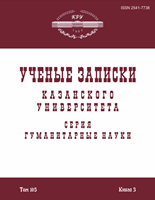Особенности языковой рефлексии детей с различными стратегиями освоения языка (по результатам экспериментального исследования)
The Features of Linguistic Reflection in Children with Different Language Acquisition Strategies (Based on the Results of an Experimental Study)
Author(s): T.A. TrifonovaSubject(s): Language acquisition, Psycholinguistics, Cognitive linguistics, Cognitive Psychology, Developmental Psychology
Published by: Казанский (Приволжский) федеральный университет
Keywords: ontolinguistics; linguistic reflection; metalinguistic activity; language acquisition strategies; referential children; expressive children; family’s sociocultural status; variability in language acqu
Summary/Abstract: This article outlines the results of a study of the features of linguistic reflection peculiar to children with different strategies of language acquisition, which is important because this problem has remained out of the attention of researchers. All data for the subsequent analysis were obtained by the methods of ontolinguistic experiment and mathematical statistics, and the criterion of verbal explicitness was used for distinguishing the features of the reflection on language among children and for defining the key terms. It was revealed that boys and girls do not differ significantly in their reflection on language, so any clear gender-related trends are not supported by our study and can be only assumed. Furthermore, it was established that referential children and children from families with high sociocultural status are more capable of reflecting on language. On the contrary, children from families with low sociocultural status and expressive children have the lowest number of reflections on language or poor prerequisites for this ability, which they acquire later as compared with referential children and children from families with high sociocultural status; such children primarily need help to develop their reflection on language and prerequisites for it. These findings can be useful to children’s speech development specialists and for psycholinguistic and ontolinguistic research, and the experimental series can be of great help as a tool for developing the reflection on language.
Journal: Ученые записки Казанского университета. Серия Гуманитарные науки
- Issue Year: 165/2023
- Issue No: 3
- Page Range: 105-118
- Page Count: 14
- Language: Russian

